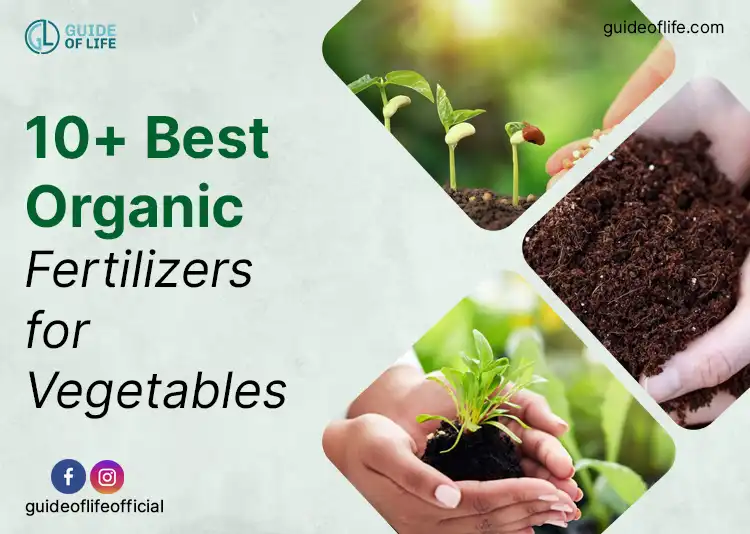10+ Best Organic Fertilizers for Vegetables

In the world of gardening, the secret to vibrant and bountiful vegetable gardens lies beneath the surface—deep within the soil. While sun and water play vital roles, it's the quality of the soil and the nutrients it contains that truly determine the success of your vegetable crops. Organic gardening, with its commitment to sustainability and respect for nature, relies on a diverse range of natural fertilizers to nourish plants, promote healthy growth, and enrich the soil. In this guide, we'll delve into the world of organic fertilizers, exploring ten outstanding options that empower you to cultivate thriving vegetable gardens, all while fostering the well-being of our planet. Whether you're a seasoned gardener or a beginner with green aspirations, you'll find the key to greener, more abundant harvests right here.
List of + Best Organic Fertilizers for Vegetables
1. Compost
Compost is a nutrient-rich, dark, crumbly material that results from the decomposition of organic matter like kitchen scraps, yard waste, and leaves. It contains a balanced mix of essential nutrients, including nitrogen (N), phosphorus (P), and potassium (K), as well as numerous micronutrients. Compost also improves soil structure, enhances water retention, and encourages beneficial microbial activity. To use compost as a fertilizer, simply spread a layer over your garden beds or mix it into the soil before planting.
2. Worm Castings
Worm castings, also known as vermicompost, are the waste products produced by earthworms during the decomposition of organic matter. They are exceptionally rich in nutrients and beneficial microorganisms. Worm castings improve soil structure, increase nutrient availability, and enhance water retention. They are particularly valuable for container gardening or as a top dressing for existing vegetable beds.
3. Fish Emulsion
Fish emulsion is a liquid fertilizer made from processed fish remains. It is rich in nitrogen, making it an excellent choice for leafy vegetables like lettuce, spinach, and kale. Fish emulsion is also a source of micronutrients and amino acids that promote vigorous plant growth. Dilute it with water according to the manufacturer's instructions and apply it as a foliar spray or directly to the soil.
4. Bone Meal
Bone meal is a slow-release fertilizer derived from ground animal bones. It is high in phosphorus and calcium, essential nutrients for root development and fruit production. Bone meal is particularly beneficial for crops like tomatoes, peppers, and root vegetables such as carrots and potatoes. Incorporate it into the soil before planting or apply it as a side dressing during the growing season.
5. Blood Meal
Blood Meal: Blood meal is a potent source of nitrogen, making it an ideal choice for vegetables that require lush, green foliage. Leafy greens like spinach, lettuce, and Swiss chard benefit greatly from blood meal. It also provides a quick nitrogen boost to plants. However, use it sparingly to avoid nitrogen overloading, which can lead to excessive leaf growth at the expense of fruit production.
6. Seaweed or Kelp Fertilizer
Seaweed or kelp-based fertilizers are derived from various species of seaweed and kelp. They are rich in micronutrients, growth hormones (auxins, cytokinins), and enzymes that enhance plant health and stimulate root development. Seaweed or kelp fertilizers are versatile and suitable for nearly all vegetable crops. They can be applied as a foliar spray or diluted in watering cans for root application.
7. Chicken Manure
It is a valuable source of nitrogen, phosphorus, and potassium, as well as essential micronutrients. It's an excellent choice for enriching the soil before planting vegetables. However, be cautious when using fresh chicken manure, as it can be high in ammonia and may burn plants. It's best to compost or age chicken manure for several months before applying it to your garden beds.
8. Bat Guano
It is another organic fertilizer that's rich in nitrogen, phosphorus, and potassium. It's particularly beneficial for fruiting vegetables like tomatoes, peppers, and eggplants, as well as flowering plants. Bat guano is available in both liquid and granular forms. Use it as directed on the product label, and avoid excessive application to prevent nutrient imbalances.
9. Cottonseed Meal
It is a slow-release organic fertilizer that contains moderate levels of nitrogen. It also provides essential micronutrients like iron and zinc. Cottonseed meal is an excellent choice for vegetables that benefit from balanced nutrition, such as beans, peas, and brassicas (cabbage, broccoli, cauliflower). It helps promote steady growth without excessive foliage.
10. Green Manure
Green manure refers to cover crops like clover, buckwheat, and hairy vetch that are grown specifically to improve soil fertility and structure. These crops are typically sown in the off-season or between planting periods and are later turned into the soil to enrich it with organic matter and nutrients. Green manure crops not only provide natural fertilizer but also help suppress weeds and prevent soil erosion.
11. Epsom Salt
Epsom salt, or magnesium sulfate, is used to correct magnesium deficiencies in the soil. While not a complete fertilizer, it can enhance the overall health of vegetables like tomatoes, peppers, and beans. Dissolve Epsom salt in water and apply it as a foliar spray or add it to the soil according to the recommended rates.
12. Alfalfa Meal
It is a slow-release organic fertilizer that contains a balanced mix of nutrients, including nitrogen, phosphorus, and potassium. It also provides trace minerals and growth-promoting compounds. Alfalfa meal benefits a wide range of vegetables, from leafy greens to root crops and fruiting plants.
13. Rock Phosphate
Rock phosphate is a natural source of phosphorus that gradually becomes available to plants over time. It's valuable for promoting root development and overall plant health. Incorporate rock phosphate into the soil before planting vegetables, especially those with high phosphorus requirements.
Conclusion
As we conclude our exploration of the best organic fertilizers for vegetables, it becomes abundantly clear that sustainable and eco-friendly gardening practices are not just a trend but a necessity. By choosing organic fertilizers, you not only enrich your soil and boost your vegetable yields, but you also contribute to a healthier planet. The principles of organic gardening invite us to work in harmony with nature, fostering resilient ecosystems and producing wholesome, chemical-free produce. Whether you opt for the rich, crumbly texture of compost or harness the power of nutrient-packed worm castings, each organic fertilizer on our list serves as a testament to the wonders of natural cultivation.

